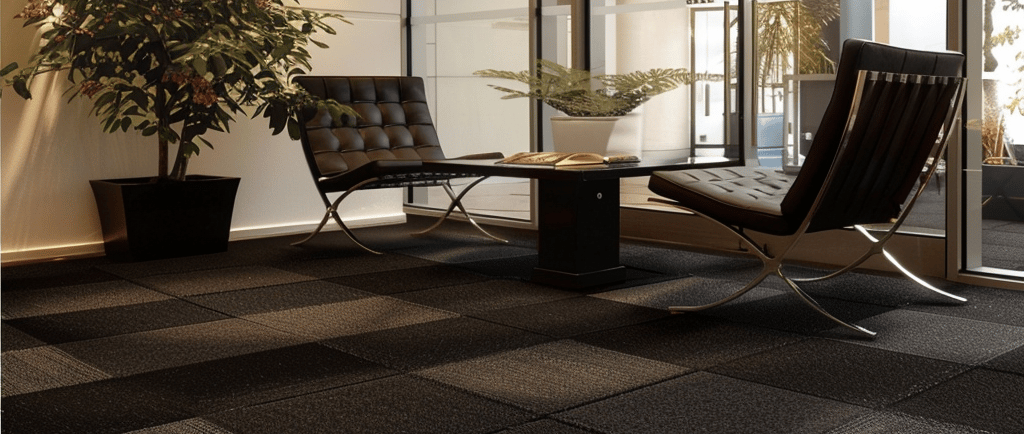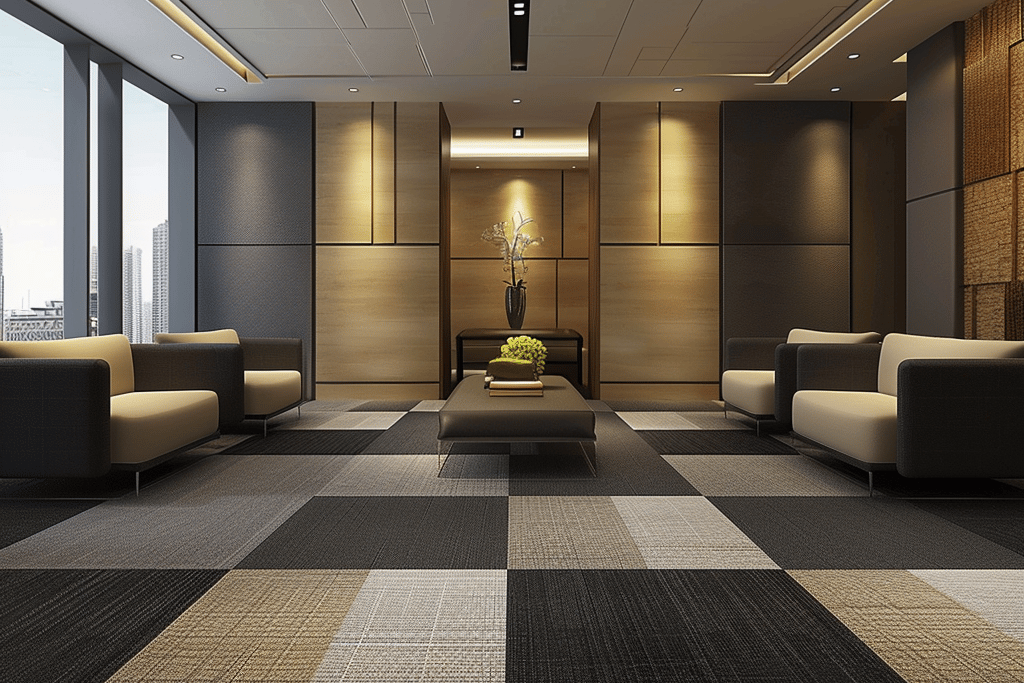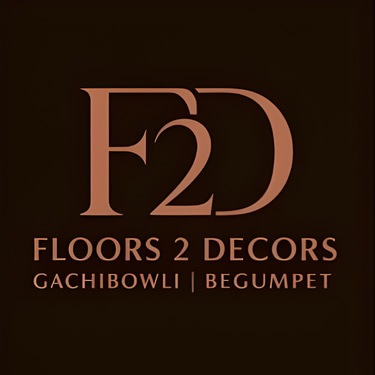Durable and Stylish: Exploring the Benefits of Carpet Tiles
Durable and Stylish: Exploring the Benefits of Carpet Tiles


Introduction to Carpet Tiles
Carpet tiles, also known as carpet squares or modular carpets, represent a versatile and practical alternative to traditional wall-to-wall carpeting. Unlike conventional carpeting, which is installed in large, continuous rolls, carpet tiles are pre-cut squares that can be easily laid down and replaced as needed. This modularity not only simplifies installation but also provides greater flexibility in design and maintenance.
The concept of carpet tiles dates back to the mid-20th century, but it has gained significant traction in recent decades. Initially popular in commercial settings such as offices and retail spaces, carpet tiles are now increasingly being adopted in residential environments due to their durability and ease of customization. The growing popularity of carpet tiles can be attributed to advancements in manufacturing techniques and the development of materials that offer both aesthetic appeal and functional benefits.
Carpet tiles are typically constructed from a variety of materials, including nylon, polypropylene, and polyester. These materials are chosen for their resilience and ability to withstand heavy foot traffic. The backing of carpet tiles is usually made from materials such as PVC or bitumen, which provide stability and prevent the tiles from shifting once installed. Additionally, many carpet tiles come with a pre-applied adhesive or interlocking system, further simplifying the installation process.
The versatility of carpet tiles allows for endless design possibilities. They can be arranged in various patterns, colors, and textures to create unique and visually appealing floor coverings. This adaptability makes them a popular choice for interior designers and homeowners looking to achieve a specific aesthetic while maintaining practicality.
In summary, carpet tiles offer a modern and efficient alternative to traditional carpeting, providing numerous benefits in terms of installation, maintenance, and design flexibility. As their popularity continues to rise, carpet tiles are becoming an increasingly common feature in both residential and commercial settings.
Durability and Longevity
Carpet tiles are renowned for their exceptional durability and longevity, making them an ideal choice for both residential and commercial spaces. The materials used in manufacturing carpet tiles, such as nylon, polypropylene, and other high-performance fibers, are specifically chosen for their resilience and ability to withstand heavy foot traffic. These fibers are tightly woven, ensuring that the carpet tiles remain intact even after years of use.
The manufacturing process of carpet tiles further enhances their durability. Advanced techniques, such as solution dyeing, ensure that the color penetrates the entire fiber, making it more resistant to fading and stains. Additionally, the backing of carpet tiles is designed to provide stability and prevent delamination, which is a common issue with traditional broadloom carpets. This robust construction allows carpet tiles to endure various environmental conditions, from high humidity to fluctuating temperatures, without compromising their structural integrity.
When comparing the longevity of carpet tiles to other flooring options, the advantages become evident. Traditional carpets often need replacing every 5 to 10 years, primarily due to wear and tear in high-traffic areas. In contrast, carpet tiles can last significantly longer, with many manufacturers offering warranties of up to 15 years or more. This extended lifespan is not just theoretical; real-world examples highlight the practical benefits. For instance, in high-traffic commercial settings like airports and office buildings, carpet tiles have been shown to maintain their appearance and functionality for over a decade.
Beyond their inherent durability, carpet tiles offer the added advantage of easy maintenance and replacement. If a tile becomes damaged or stained, it can be individually replaced without disrupting the entire floor. This feature not only extends the overall lifespan of the flooring but also contributes to cost savings over time. Therefore, when assessing flooring options, carpet tiles stand out as a durable and long-lasting solution that combines resilience with practicality.
Aesthetic Appeal and Design Flexibility
Carpet tiles offer unparalleled aesthetic appeal and design flexibility, making them an ideal choice for a variety of interior environments. One of the most significant advantages of carpet tiles is the extensive array of colors, patterns, and textures available. Whether you prefer vibrant hues, subtle tones, intricate patterns, or simple designs, carpet tiles cater to diverse tastes and preferences, allowing for endless creative possibilities.
The modular nature of carpet tiles enables customization, providing the opportunity to mix and match different tiles to create unique and personalized designs. This versatility allows for the creation of intricate patterns, such as checkerboards, stripes, or even custom logos and images. Furthermore, carpet tiles can be easily replaced or reconfigured, offering a practical solution for spaces that require frequent updates or rebranding.
Carpet tiles are not confined to traditional office settings; they are equally effective in residential spaces, educational institutions, and hospitality venues. For instance, in a modern office, carpet tiles can be used to delineate different work zones or to add a splash of color to an otherwise neutral palette. In a residential setting, they can define areas within an open-plan living space, adding warmth and character.
Several innovative design projects have demonstrated the transformative power of carpet tiles. One notable example is the renovation of a high-end hotel lobby, where designers utilized a combination of plush, textured carpet tiles in varying shades of blue to evoke a sense of luxury and tranquility. Another example is a contemporary educational facility that employed bright, geometric-patterned carpet tiles to create an engaging and stimulating environment for students.
In summary, carpet tiles provide the perfect blend of durability and aesthetic appeal. Their wide range of colors, patterns, and textures, combined with the ability to customize and adapt designs, makes them a versatile and stylish choice for any interior space.
Ease of Installation and Maintenance
One of the most attractive features of carpet tiles is their ease of installation. Unlike traditional broadloom carpets, which often require professional installation due to their size and weight, carpet tiles offer a more user-friendly alternative. Thanks to their modular nature, carpet tiles can be easily installed by individuals with minimal experience. This DIY-friendly approach not only reduces labor costs but also allows for greater flexibility in design and layout. Homeowners and business owners alike can experiment with different patterns and configurations, tailoring the floor to their specific aesthetic preferences.
For those who prefer professional installation, the process is equally straightforward and efficient. Professional installers appreciate the simplicity of working with carpet tiles, which often come with pre-applied adhesive backing or can be installed using double-sided tape or adhesive tabs. This means that the installation process is quicker and less labor-intensive compared to traditional carpeting methods. Whether opting for DIY or professional installation, the minimal preparation required and the ease of handling individual tiles make carpet tiles a convenient choice.
Maintenance is another significant advantage of carpet tiles. Regular cleaning is simplified, as tiles can be vacuumed like any other carpet. However, the true benefit lies in the ability to address spills, stains, or damage with minimal disruption. Instead of replacing an entire carpet, individual tiles can be lifted and cleaned or replaced as needed. This targeted approach not only extends the life of the carpet but also results in cost savings over time. Additionally, many carpet tiles are designed with stain-resistant and antimicrobial properties, further enhancing their durability and ease of care.
Overall, the practical benefits of carpet tiles in terms of installation and maintenance make them an appealing option for both residential and commercial settings. The combination of easy installation methods and simplified maintenance routines contributes to their growing popularity in the flooring market.
Cost-Effectiveness and Sustainability
Carpet tiles have emerged as a cost-effective flooring solution for both residential and commercial spaces. Their modular nature allows for easy installation, which can significantly reduce labor costs compared to traditional broadloom carpets. Furthermore, when it comes to maintenance, carpet tiles offer distinct financial advantages. Should a section become stained or damaged, only the affected tiles need to be replaced, rather than the entire carpet. This targeted approach to repairs not only minimizes costs but also extends the lifespan of the flooring, making it a prudent long-term investment.
Another noteworthy aspect of carpet tiles is their sustainability. Many manufacturers are now producing carpet tiles using recycled materials, such as reclaimed nylon or polyester, thereby reducing the demand for virgin resources. This practice not only conserves natural resources but also minimizes waste, contributing to a circular economy. Additionally, carpet tiles are designed for reusability. If a space undergoes remodeling or if tiles are no longer needed in their initial location, they can often be lifted and reinstalled in a different area. This flexibility reduces the volume of waste sent to landfills, further underscoring the environmental benefits of carpet tiles.
Environmental impact studies have shown that carpet tiles generally have a lower carbon footprint compared to traditional broadloom carpets. This is due in part to their modular design, which often results in less material waste during both manufacturing and installation. Eco-conscious consumers have praised carpet tiles for their blend of durability and sustainability. For instance, one satisfied user noted, "I chose carpet tiles for my office not only for their aesthetic appeal but also because they align with my commitment to sustainable living. Knowing that they are made from recycled materials and can be reused in the future makes me feel great about my choice."
In conclusion, the cost-effectiveness and sustainability of carpet tiles make them a compelling choice for modern flooring solutions. Their affordability, long-term financial benefits, and positive environmental impact present a strong case for considering carpet tiles in any renovation or new construction project.
Conclusion: The Future of Carpet Tiles
In our exploration of carpet tiles, we have delved into their numerous benefits, emphasizing their durability, stylish appeal, ease of installation, cost-effectiveness, and sustainability. Carpet tiles are designed to withstand high foot traffic, making them a reliable choice for both residential and commercial spaces. Their modular nature not only allows for creative and unique floor patterns but also ensures that damaged sections can be easily replaced without disturbing the entire flooring.
Style is another significant advantage of carpet tiles. With a wide array of colors, patterns, and textures available, they offer endless design possibilities. This versatility ensures that carpet tiles can complement any décor, from modern minimalist to traditional settings. The ease of installation and maintenance further enhances their appeal, making them an excellent choice for DIY enthusiasts and professional installers alike.
Cost-effectiveness is a crucial consideration for any flooring project. Carpet tiles generally present a more affordable option compared to traditional broadloom carpets, both in terms of initial investment and long-term maintenance costs. Their durability translates to fewer replacements over time, thereby offering significant savings. Moreover, the ability to replace individual tiles reduces waste and promotes a more sustainable approach to flooring.
Looking ahead, the future of carpet tiles appears promising with continuous advancements in technology and design. Innovations such as recycled materials and eco-friendly manufacturing processes are gaining traction, aligning with the growing emphasis on sustainability. Smart carpet tiles, incorporating sensors and connectivity features, are also emerging, offering new functionalities like tracking foot traffic and adjusting indoor environments accordingly.
As we move forward, the carpet tile industry is poised to introduce even more creative and sustainable solutions, making them an increasingly attractive option for modern flooring needs. Whether embarking on a new construction or a renovation project, considering carpet tiles could be a wise and forward-thinking choice.


# Durable and Stylish: Exploring the Benefits of Carpet Tiles
In the world of flooring solutions, carpet tiles have emerged as a frontrunner, combining practicality with aesthetic appeal. These modular flooring units have revolutionized the way we think about carpeting, offering a perfect blend of durability and style. Whether you're renovating your home or upgrading your office space, carpet tiles present a compelling option that deserves serious consideration.
## The Durability Factor
One of the primary advantages of carpet tiles is their exceptional durability. This quality makes them an ideal choice for both residential and commercial spaces, especially in high-traffic areas.
### 1. Wear Resistance
Carpet tiles are engineered to withstand heavy foot traffic. Many are constructed with robust synthetic fibers like nylon or polypropylene, which are known for their ability to maintain their shape and appearance even under constant use.
### 2. Stain Resistance
Most carpet tiles come with built-in stain-resistant properties. This feature is particularly beneficial in environments prone to spills, such as homes with young children or offices with frequent coffee drinkers. The stain-resistant treatment helps prevent liquids from penetrating deep into the fibers, making cleanup easier and maintaining the carpet's appearance over time.
### 3. Easy Replacement
Perhaps one of the most significant durability advantages of carpet tiles is the ease of replacement. If a section becomes damaged or heavily stained, you can simply replace the affected tiles rather than the entire floor. This targeted replacement approach not only saves money but also extends the overall lifespan of your flooring.
### 4. Moisture Resistance
Many carpet tiles are designed with moisture-resistant backings, making them suitable for areas that may be exposed to occasional moisture. This feature helps prevent mold and mildew growth, contributing to a healthier indoor environment.
## Style and Aesthetics
While durability is crucial, the aesthetic appeal of carpet tiles is equally important. These versatile flooring options offer unparalleled design flexibility, allowing you to create unique and stylish spaces.
### 1. Vast Design Options
Carpet tiles come in an extensive range of colors, patterns, and textures. From solid colors to intricate designs, there's a carpet tile to suit every aesthetic preference. This variety allows you to create custom looks that complement your existing décor or make a bold statement.
### 2. Mix and Match Capability
One of the most exciting aspects of carpet tiles is the ability to mix and match different styles. You can combine various colors or patterns to create unique designs, define specific areas within a larger space, or add visual interest to an otherwise monotonous floor.
### 3. Texture Variety
Carpet tiles are available in various pile heights and textures, from low-profile tiles suitable for office environments to plush, comfortable options for residential spaces. This variety allows you to not only create visual interest but also cater to the specific needs of different areas in your home or office.
### 4. Create Defined Spaces
In open-plan environments, carpet tiles can be used to create visual boundaries between different functional areas. For example, in an office, you might use different colors or patterns to delineate workstations from meeting areas.
### 5. Brand Integration
For commercial spaces, carpet tiles offer a unique opportunity to incorporate brand colors or even logos into the flooring design. This can be an effective way to reinforce brand identity throughout a space.
## Additional Benefits
Beyond durability and style, carpet tiles offer several other advantages:
### 1. Noise Reduction
Carpet tiles help absorb sound, reducing echo and noise levels in a room. This acoustic benefit is particularly valuable in open-plan offices or busy home environments.
### 2. Comfort Underfoot
Compared to hard flooring options, carpet tiles provide a softer, more comfortable surface to walk and stand on. This can be especially beneficial in spaces where people spend long hours on their feet.
### 3. Improved Indoor Air Quality
Quality carpet tiles can actually contribute to better indoor air quality by trapping dust and allergens, which can then be easily removed through regular vacuuming.
### 4. Easy Installation and Maintenance
Carpet tiles are generally easier to install than traditional wall-to-wall carpeting, often making it a viable DIY project. They're also easy to clean and maintain, with regular vacuuming and occasional deep cleaning being sufficient to keep them looking their best.
### 5. Sustainability
Many manufacturers now offer carpet tiles made from recycled materials or those that are fully recyclable at the end of their life cycle. This makes carpet tiles an environmentally conscious choice for those looking to reduce their carbon footprint.
## Conclusion
Carpet tiles represent a modern flooring solution that truly delivers on both durability and style. Their ability to withstand heavy use while offering unprecedented design flexibility makes them an attractive option for a wide range of applications. Whether you're looking to create a cozy living room, a professional office space, or a vibrant commercial environment, carpet tiles provide a versatile foundation that can adapt to your needs and preferences.
As we continue to seek innovative ways to balance functionality with aesthetics in our living and working spaces, carpet tiles stand out as a flooring option that doesn't compromise on either. By choosing carpet tiles, you're not just selecting a floor covering; you're investing in a durable, stylish, and flexible solution that can evolve with your space over time.
